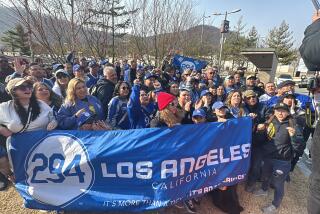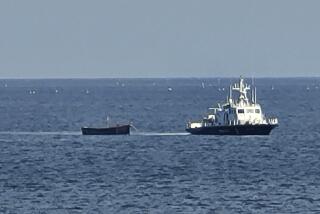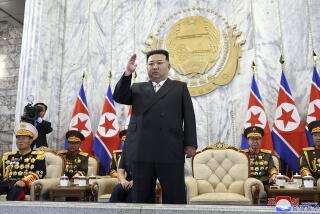North, South Koreans Exchange Visits : 151 From Either Side in 1st Crossing Since Country’s Split in 1945
- Share via
SEOUL, South Korea — For the first time since their country was divided in 1945, North and South Korea sent to each other’s capitals Friday groups of ordinary Koreans separated from family and relatives for three decades.
Thousands of South Koreans came out of their farm homes along the 25-mile road south from the truce village of Panmunjom to wave at or simply watch a cavalcade of automobiles. Other thousands paused on city streets to welcome their guests from the north.
Their faces showed no signs of the enmity that has blocked all but sporadic and minimal government contact between the two Koreas since the end of the 1950-53 Korean War.
The cavalcade brought a 151-person mission of North Koreans through downtown Seoul, past the 100,000-seat Chamsil Stadium, site of the 1988 Olympics, which the North Koreans are not scheduled to attend, and finally to a hotel on the eastern outskirts of this city of 9 million.
A similar mission of 151 South Koreans crossed the border at Panmunjom and arrived later in the North Korean capital of 1 million.
Exchange Nearly Snagged
It was learned Friday that an 11th-hour objection by the North Korean Red Cross to three of the South Koreans named to travel north nearly sabotaged the exchange, the first of its kind since the Soviet and American occupation after World War II led to division of the country.
Secret meetings were held at Panmunjom on Wednesday and Thursday before the South Korean Red Cross yielded and replaced the three. The north charged that the three had committed “unpardonable crimes” during the Korean War, but no details were made public.
The North Koreans who came here are scheduled to begin reunions with their relatives later today, but the complete program for their four-day visit had not yet been prepared, apparently because of the last-minute dispute.
Each 151-member delegation includes 50 ordinary citizens who are visiting their birthplaces in the Seoul or Pyongyang areas. Each also includes 50 artists, 30 journalists and 20 support personnel. The presidents of the two Red Cross societies also are included.
Bishop Seeks Relatives
Among the South Koreans who went north was Bishop Daniel Chi Hak Soun, 64, head of the Roman Catholic diocese of Wonju. At Panmunjom, he told reporters that he was so excited at the prospect of meeting a brother and a sister whom he has not seen since 1949 that “I cannot express my feelings as I would like to.”
The bishop said he hoped to say Mass in the Communist capital, “but I don’t know if I will be allowed to do so.”
Another South Korean visitor to the north, Hong Sung Chul, a former minister of home affairs, said at Panmunjom that “I couldn’t sleep well for days thinking of seeing my elder sister from whom I was separated 39 years ago. I firmly believe she is alive.”
None had assurances in advance that they would be able to see the relatives they sought.
A nun, Kang Song Suk, 55, who runs a clinic for retarded children, said she was carrying gifts for her mother and elder brother, whom she hopes to meet in Pyongyang.
The North Koreans, all wearing badges bearing a picture of Kim Il Sung, the dictator who has ruled their country for all of its 40-year history, crossed the border without smiles in the morning.
The entire delegation attended a lunch and a dinner in their honor Friday, but most of them spent the afternoon secluded in their hotel rooms.
Visits Are ‘a Landmark’
Their leader, Sohn Song Pil, 58, president of the North Korean Red Cross, read a statement at Panmunjom describing the exchange as “a landmark in the history of Korea.”
It was Sohn’s second visit to Seoul at the head of a North Korean mission. He led a Red Cross team that visited here in 1972, the year in which the two Koreas established their first post-Korean War contacts and began the long series of Red Cross talks aimed at reuniting an estimated 10 million Koreans separated from relatives by partition and war.
The exchange visits that began Friday are the first specific results of those talks.
The South Korean Red Cross president, Kim Sang Hyup, a former prime minister under President Chun Doo Hwan, said at Panmunjom before heading north that the Red Cross talks “have been punctuated with hardships and troubles.”
He said he regrets that only 50 people separated from their families and relatives were allowed to make the trip from each country and that the scope of visits had been restricted to Seoul and Pyongyang at North Korean insistence.
More to Read
Sign up for Essential California
The most important California stories and recommendations in your inbox every morning.
You may occasionally receive promotional content from the Los Angeles Times.













